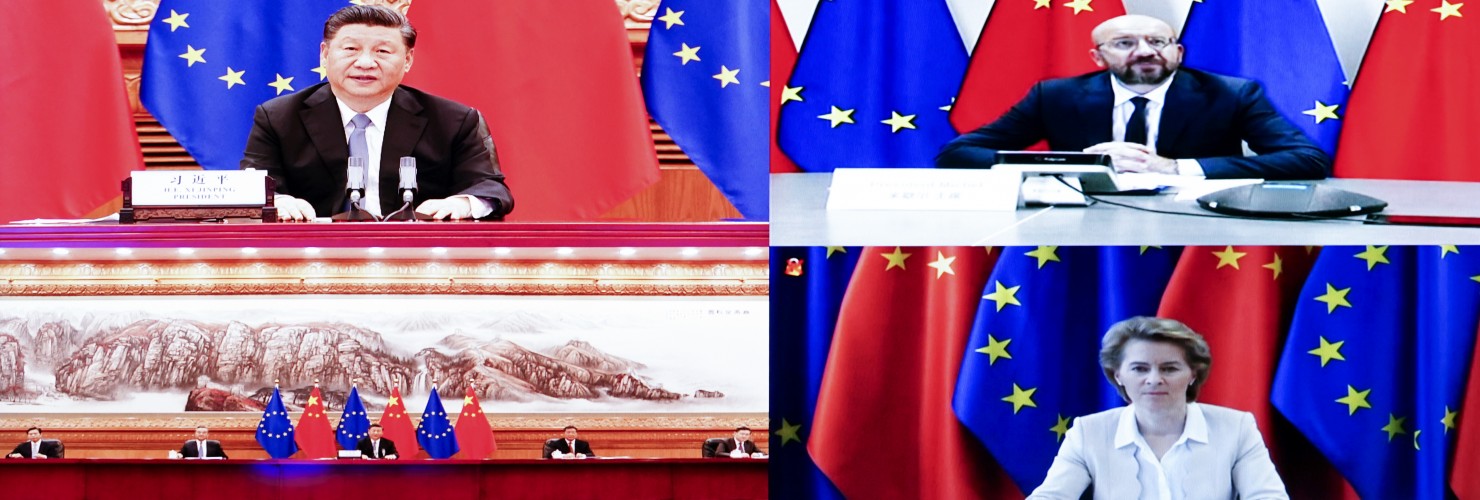

Mastering EU-China relations: German presidency is faced with challenges
The meager result of the EU-China summit shows Brussels is becoming more assertive with China. Grzegorz Stec says Germany’s EU Presidency has to capitalize on this trend.
The Covid-19 crisis has seen a surge in the rivalry between the US and China – and the European Union not aligning itself with either in an attempt to limit the erosion of the multilateral system. As Germany begins its six-month EU Presidency, this stance is becoming known as the Sinatra or My Way Doctrine after High Representative (HR) Josep Borrell pledged the EU would “uphold and defend our own interests and values” to try „to keep the multilateral system as a space for co-operation”.
Under the Sinatra Doctrine, Brussels on the one hand has been careful not to isolate Beijing by toning down confrontations on politically sensitive issues – the EU diluting the World Health Assembly motion to investigate the origins of Covid-19 or a statement by Borrell late May that the EU wasn’t considering punitive actions over China’s planned national security law for Hong Kong are two stand-out examples.
Brussels has started making more assertive noises
But, on the other hand, Brussels has also started making more assertive noises. The 22nd EU-China Summit in late June saw a shift in the EU’s China rhetoric. The first official meeting of the EU’s new bosses and the Chinese leadership had a politically a higher than usual rank as it was joined by President Xi Jinping. But the results were limited. Neither did the two sides issue a joint statement, nor did they sign the EU-China Agenda 2025, an agreement that had looked possible two weeks before.
The summit was used by the EU to deliver directly to China’s leaders a message that was clearer and more assertive than any they had heard from Borrell. Commission President Ursula von der Leyen in particular highlighted Europe’s dissatisfaction with China’s limited actions on multiple fronts – asymmetry in market access, unsatisfactory progress on the Comprehensive Agreement on Investment, climate action, WTO reform, to name but a few, – and laid the responsibility for lack of progress on a Chinese side that has yet to match the EU’s “level of ambition.”
Crucially, von der Leyen used much stronger language than Borrell about the “systemic rivalry” of the EU and China. While High Representative recently indicated that he found this rivalry hard to define, von der Leyen noted the regions had “two very different systems, very different views on values”. She also called human rights “non-negotiable” for the EU, and stressed that implementation of the national security law in Hong Kong would mean China risking “negative consequences”.
EU wants to increase economic and strategic security in the face of an assertive Beijing
The Commission President’s tougher rhetoric and the summit’s meager results have to be seen in the context of broader momentum relating to China that was easy to see in Brussels in the two weeks before the summit. The Commission took steps towards the goals of the 2019 Strategic Outlook on EU-China relations to increase the EU’s economic and strategic security in the face of an assertive Beijing.
The Commission published a long-anticipated “White Paper” about reducing the distortions of foreign state-aid on the single market, and imposed landmark tariffs on Egyptian glass-fiber exporters that benefit from Chinese state-aid by dint of being subsidiaries of Chinese companies. On top of that, Commission and the High Representative issued a joint statement on fighting digital disinformation in which China was named alongside Russia as running “targeted influence operations and disinformation campaigns in the EU, in its neighborhood, and globally”.
Hong Kong provides new impetus for „systemic rivalry” narrative
New impetus for “systemic rivalry” was provided by the European Parliament’s resolution on Hong Kong. An overwhelming majority of MEPs passed a resolution urging the Commission and the Council to make Hong Kong “a top priority” at the summit and for using the EU’s economic leverage in the human-rights dialogue with China. The EU also joined the G7 countries to issue a joint declaration urging China to reconsider its decision on the Hong Kong security law – very different to late May, when it declined to join a statement by the UK, Australia, Canada and the US.
The summit was not a dramatic turning point in the EU’s approach on China. For one, von der Leyen neither specified potential punitive measures against China nor suggested that any were under consideration. But it reflected the shifts in rhetoric and the broader momentum on China in Brussels and indicated that a more assertive edge is coming to the forefront in member-state capitals. More rhetorical pressure on China to stick to commitments and address issues of “systemic rivalry” is a start.
It also provides useful momentum for Germany’s EU Council Presidency. Before it took the helm on July 1 Germany issued a revised program in which it pledged to demand greater reciprocity from China and to raise the emphasis a term missing from earlier drafts. With work on the EU-China Agenda 2025 pushed into autumn and leaders from China and the 27 EU member states delayed, Germany has the chance to capitalize on the momentum of the EU’s course adjustment and lead to a full-throated My Way Doctrine.

